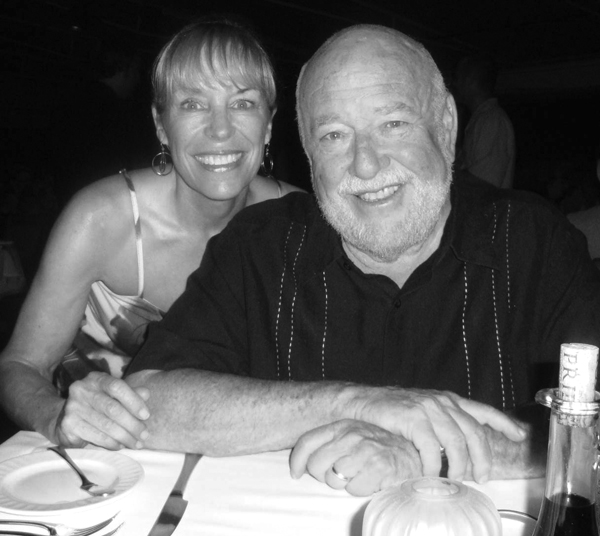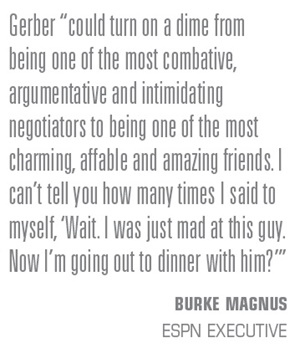 |
Chuck Gerber and wife Daryl
Photo by: COURTESY OF DARYL GERBER
|
Longtime media executive Chuck Gerber, who died Nov. 6 at the age of 71 after a short illness, will be remembered less for what he did than how he did it.
That’s not to say that he had a bland career. Described as an “iron marshmallow” — an old softie with a rough exterior — Gerber had one of the gaudiest résumés in college sports. He helped create successful TV channels like ESPNU and SEC Network. He negotiated deals that brought billions of dollars in media rights fees to the SEC. He consulted for the NCAA, College Football Playoff … you name it.
But in the days after his death, Gerber’s closest friends remembered his larger-than-life personality more than his business accomplishments.
Take Mike Slive, for example. When Slive was asked to be commissioner of the SEC in 2002, one of his first calls went to Gerber, whom he had befriended years earlier when Slive was at Conference USA and Gerber at ESPN. The two met at the Atlanta Hyatt in the back corner of a restaurant.
When asked over the summer what he said to Slive at the time, Gerber took a long pause and said with his gravelly voice, “The first thing I said to him was, ‘Do they know you’re Jewish?’ We both laughed.”
Gerber followed that quip with sage advice, telling Slive: “If you want to leave a legacy in college sports, you can’t do it from Conference USA. You can do it from the SEC.”
The moment was typical Gerber. His longtime friend and mentee, ESPN executive Burke Magnus, recalled that Gerber “could turn on a dime from being one of the most combative, argumentative and intimidating negotiators to being one of the most charming, affable and amazing friends. I can’t tell you how many times I said to myself, ‘Wait. I was just mad at this guy. Now I’m going out to dinner with him?’”
From their days working together at ESPN, Magnus recalled double dates that he and his wife Colleen took with Gerber and his wife Daryl in Hartford, Conn., starting at Max Downtown restaurant before heading to the theater.
Slive, too, recalled his social encounters, remarking that most of the conversations he had with Gerber started with a cigar and a glass of wine — or maybe something stronger.
Off the record source, sort of
It’s hard not to laugh at a search of SportsBusiness Journal’s archives for stories in which Chuck Gerber was quoted. That’s because there were so few. Gerber talked to SportsBusiness Journal reporters dozens of times over the past decade. But you can find him quoted only in a handful of stories.
Reporter conversations with Gerber always ended the same way. He was adamant that he couldn’t be quoted directly. “I can’t have anybody find out that we even talked,” he would say, almost with what sounded like a panicked voice.
The funny thing, though, is when reporters would call other industry executives looking for information, they’d usually respond by saying, “Chuck told me that he talked to you.”
So much for secrecy.
— John Ourand
Asked over the summer about how he and Slive created the concept of midweek games in college football, Gerber started his story like he did so many others. “We were at the Hilton in Destin,” Gerber said. “He and I were sitting on the patio of his room, smoking a cigar.”
Slive’s home in Birmingham is filled with pictures of the two men, including several from Slive’s 70th birthday party a few years ago.
From the time Slive hired Gerber to be the SEC’s media consultant in 2008, the two were inseparable — a powerful team that left a huge imprint on college media.
Their trust was formed from years of working together, but there was one event that earned Slive’s undying loyalty. When the commissioner’s father died in the late 1990s, Gerber unexpectedly showed up at the funeral in Syracuse. It was a gesture that still makes Slive emotional.
“Chuck was funny, candid and sensitive in a way that few knew,” Slive said.
Magnus said that few saw the candid and sensitive side of Gerber during negotiations. “He was a tough customer,” Magnus said. “He always knew where he stood, and he always let you know where you stood.”
Magnus recalled negotiating against Gerber for the SEC package in 2008. What made the deal so difficult for Magnus was that he was using a playbook that — literally — was written by Gerber. In March 2008, Gerber left ESPN to consult with the SEC. In the months leading up to his departure, he created ESPN’s SEC strategy.
“He knew that I knew that he knew our plans,” Magnus said. “The SEC didn’t leave anything on the table. But ultimately he wanted what was best for the SEC and best for ESPN.”
Turner Broadcasting President David Levy sounded a similar note. He cited Gerber as “one of the key reasons” why Turner has the NCAA tournament today because he understood both the media and college conference worlds better than almost anyone else. “Chuck got the NCAA to understand the cable position,” Levy said. “I will always remember that day.”
Former ESPN executive Sean Bratches recalled playing golf frequently with Gerber. “He used to say to me that the key to golf is not to take a lesson, but to always take lessons,” Bratches said. “True in golf and life.”
Once Gerber slipped away from ESPN and started his consulting practice, he worked on many of the deals that drove billions of new revenue into the college ranks, ranging from the SEC to the NCAA and the College Football Playoff. During the CFP’s first negotiations, Gerber teamed with Dean Jordan from Wasserman Media Group.
Gerber and Jordan had sat on opposite sides of the table before, but the CFP represented their first chance to work together.
“When you’re always negotiating against someone, you don’t always see eye-to-eye and it doesn’t necessarily lead to a warm-and-fuzzy relationship,” Jordan said. So when CFP Executive Director Bill Hancock told Gerber and Jordan that they’d work together as consultants, “I thought, well, this is going to be interesting,” Jordan said. “After the first lunch, there was no doubt we would work together well. We often shared our opinions and most of the time we were pretty close.”
One of the most-read stories about Gerber in SportsBusiness Journal resulted from the negotiations between the NCAA and Turner Sports, which teamed with CBS to win the March Madness rights in 2010. It was a short sidebar about the two consultants who worked on the deal for the NCAA — Gerber and Kevin O’Malley.
O’Malley represented several schools and conferences and often negotiated against Gerber when Gerber ran college sports for ESPN. In 2010, they were brought together in a strange alliance — consultants who would tag-team the NCAA’s negotiations.
Neither of them went into the arrangement optimistic. Their styles couldn’t have been more different, so much so that the headline to the SportsBusiness Journal story simply read: “The Odd Couple.”
From the story: Kevin O’Malley is fine dining, while Chuck Gerber is the local deli. O’Malley is Brooks Brothers and penny loafers, Gerber is a sweater and no socks. O’Malley is a well-crafted, polite perspective, usually topped off with a subtle smile. Gerber is a salty argument, usually topped off with a four-letter word.
O’Malley recalled that, after a long day of negotiations in Atlanta, the two went for a walk. They settled in a downtown restaurant and talked about the day.
“I wanted to put more pressure on the networks that were bidding,” O’Malley said. “But Chuck said, ‘They’re trying hard, let’s give it a few more days.’ I told Chuck that he was blowing his cover because everyone knew him as a tough guy. ‘You’re really just a teddy bear.’”
As they got up from the table, Gerber replied: “Don’t tell anyone. I wouldn’t want that to get around.”





